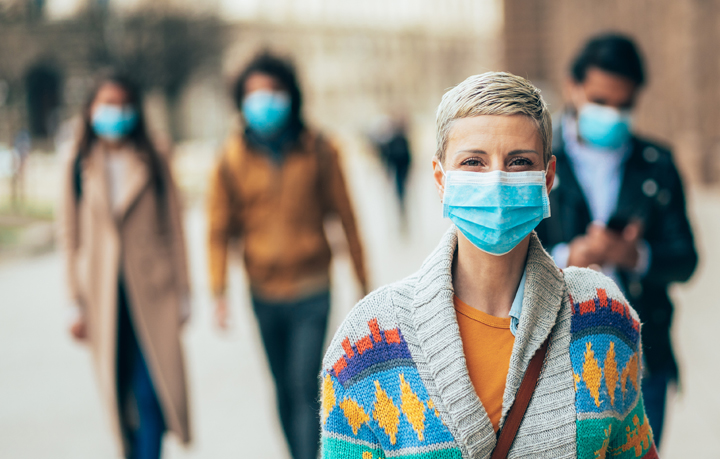To mask, or not to mask? That is the question.
And it needs an answer — YES — right away.
Look at photographs or video of people walking in the Czech Republic or Hong Kong, two countries where the Covid-19 epidemic appears to be contained, and almost everyone is wearing a face mask. In the United States, by contrast, only a minority of people wear masks when they are out in public.
Covid-19 has emerged as a global, once-in-a-century pandemic that is affecting all nations. Its high transmisibility (R factor) has produced geometric increases in seriously ill individuals and overburdened health care systems.
Social distancing appears to be buying some time to improve screening for the disease, conduct contact tracing, and develop therapeutics such as antivirals, neutralizing antibodies, and ultimately vaccines. Yet despite heroic efforts and high economic cost, cases and deaths continue to mount across the U.S.
Can we do more? Yes. I believe that the federal government and all of the states should enforce a nationwide stay-at-home directive for the month of April and mandate universal face mask use outdoors until an effective vaccine is available. While authorities have so far discouraged citizens from using face masks, the recent data of community spread by asymptomatic individuals is a game-changer for the face mask conversation.

To be clear, we must first ensure an adequate supply of face masks for our health care providers. Once our manufacturing capability has increased, new cases have significantly declined, and we are at a low level of infection — such as what China is currently experiencing — we should quickly pivot to face mask use for the general public.
Countries in which face mask use is routine, such as Taiwan and Japan, have experienced dramatically flatter curves than countries where it is not. As a recent review in The Lancet noted, “As evidence suggests Covid-19 could be transmitted before symptom onset, community transmission might be reduced if everyone, including people who have been infected but are asymptomatic and contagious, wear face masks.”
A national call to action for universal face mask use outdoors would not only accelerate the decline in the ability of an individuals to infect others in the community but also prevent a resurgence of infections — a real possibility given the asynchronous hotspots and high mobility of the SARS-CoV-2 coronavirus throughout the U.S. Pervasive use of face masks could also accelerate the resumption of normal economic activity across the country.
Starting today, the White House Coronavirus Task Force, in accordance to the Defense Production Act, should direct our manufacturing base to build capacity beyond the efforts of 3M, which has doubled global production of N95 face masks to about 100 million a month, and is planning to push that to 2 billion within a year. The country must repurpose existing manufacturing capacity to stockpile critical supplies and set a challenge to the nation’s manufacturers to produce a surplus of 1 billion masks by the end of April 2020 and at least 1 billion per week thereafter. This would provide all Americans with several masks per week. Production costs should be less than $1 per mask or $1 billion per week.
How do we do this? Let’s go all-in for the next eight weeks — implement a nationwide stay-at-home directive, ramp up face mask manufacturing capacity, and for now use makeshift face masks until ideal units become available for public use. This will buy precious time for the system to catch-up and enable America’s return to normalized social interactions, resumption of school and work, and restart our consumer economy. The return on investment would be enormous.
Now is the time to act. Our lives and our livelihood depend on it.
Ronald A. DePinho, M.D., is a distinguished university professor and the past president of MD Anderson Cancer Center and founder of several biotechnology companies.
Source: STAT
